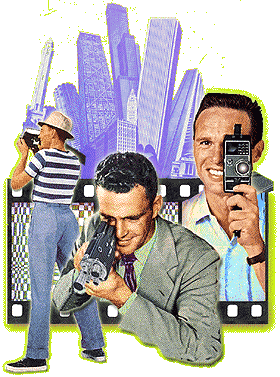
Why are indie documentaries cooler than indie feature films?
Maybe it's the way new technology gets intimate with the hidden parts of society... Or maybe what's really going on out there is just weirder than anything the new kid writers/directors can dream up. Even The Blair Witch Project needs the audience to think it's for real.
Whatever the reason, at this year's Chicago Underground Film Festival, the docs stood out. Here are three of the best. Keep an eye out at your cooler local film festivals or art house movie theaters.
I Created Lancelot Link (Video, 15 mins)
Dir. Jeff Krulik
"I've always been drawn to stories you couldn't make up, that just seemed like you couldn't create it," says Jeff Krulik. "The reality video I love is stuff that's just so far out, so off beat. The greatest compliment is when someone asks 'Is this for real?' and in fact, it is."
Krulik should know. He's the director of the oft-bootlegged burnout exposé, Heavy Metal Parking Lot. His new movie, winner of the documentary short at CUFF, is a look behind the scenes of the 1969 TV show Lancelot Link. The simian ancestor of The Chimp Channel was Get Smart meets The Mod Squad at the zoo. The stories revolved around a troop of hippie chimps who play in a band called The Evolution Revolution, but it's all a screen for their "undercover spy operation."
"I always loved the TV show as a kid and was obsessed with it," says Krulik. "I strong-armed my brothers into naming the family dog Lancelot Link. They called him Lance, but his full name was Lancelot Link Secret Spy."
He got the idea to make the movie when co-producer (and ex-girlfriend) Diane Bernard became friends with the stepson of one of the creators. Krulik and Bernard went to L.A. to interview the responsible parties, Stan Burns and Michael Marmer, a pair of writers who had previously written for TV greats like Ernie Kovacs, Carol Burnett, and Flip Wilson.
Fascinating as it is to hear about chimp temper tantrums -- how the lead female kept throwing off her jewelry, and how the band drummer had 'natural rhythm,' -- the jolt comes when you see the backstage clips from the show -- you expect a couple of pot-smoking subversives, but what you get is two guys who look like Mel Brooks.
Target Shoots Back (Video, 70 mins)
Dir. Chris Wilcha
It's 1992 and 22-year-old ex-punk Chris Wilcha graduates with a philosophy degree ... and puts it to use at Columbia House. With Nirvana reaching their peak, Wilcha slowly becomes the CD club's resident "alternative" expert with a knack for what "the kids" are into. To relieve his "working-for-the-man" guilt, he brings his video camera with him constantly.
"I taped obsessively -- meetings, office parties, fights, phone calls -- with no specific goal. That's the benefit and burden of video -- you can tape everything cheaply, but then you have to suffer through hours of torturously boring footage to find the good stuff."
The result is a fluke of an opportunity -- once management drones hear of this film, they're sure to ban videocameras from the office -- and it's heartbreaking to see Wilcha putting his evident creativity to work for Columbia House as he earnestly breathes fresh life into a stuffy corporation only to realize that all he's done is sell out his generation.
An ironic footnote -- after Wilcha left the company to go to film school (where he edited this video), he returned to New York only to get a job at his old workplace. His colleagues and bosses have no idea that this video exists and Wilcha is counting the days before they find out and he's fired. At least he'll have one hell of an epilogue.
American Passport (16mm, 83 mins)
Dir. Reed Paget
The film starts out with news footage of two Seattle parents as they fear for their son's life during the Tienanmen Square uprising. They needn't have worried. Reed Paget (and his 16 mm camera) comes out unscathed... But newly driven by the rush of the forbidden, he goes on a several year jaunt across the globe filming one dangerous situation after another.
"I left the U.S. in March of 1989. I spent three months in China, three in Indo-China, ran out of money and came back to the states. In 1990, I set off again; I didn't come back till 1991. I'd gone from Nicaragua to Peru to South Africa to Russia to Israel and shot 40,000 feet of neg (about 19 hours)." Then he spent the next eight years in torturous edits, trying to make sense of it all.
What emerges is a film that gets past the "people are suffering in far off places" type of doc, mostly owing to Paget's head-on personality. He challenges the U.S. diplomat in Panama, gets embroiled in a shoot-out in South Africa, and finds love with a millionaire's daughter in Berlin where they're trying to infiltrate the former USSR army. Of course, he soon ditches the girl to continue his exciting adventures in Israel so he can get as close to the Iraqi "conflict" as possible, (and gets more than he expected).
This film reeks of macho bravado, but Paget tempers it with the insight that his brand of gonzo journalism is fueled by the same rush that causes men to make war in the first place. I'm not going to give away the ending but it's truly unbelievable. A must see.
Sarah Jacobson is a writer/filmmaker.
